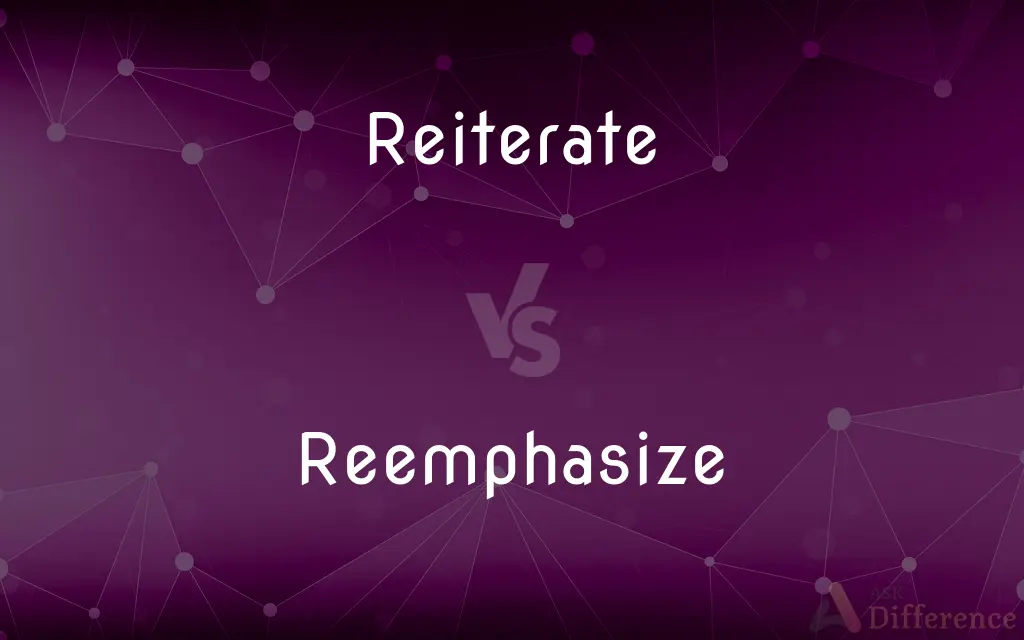Reiterate vs. Reemphasize — What's the Difference?
Edited by Tayyaba Rehman — By Maham Liaqat — Updated on April 4, 2024
Reiterate means to say or do something again, often for clarity or emphasis, whereas reemphasize underscores the importance of a previously stated idea or point.

Difference Between Reiterate and Reemphasize
Table of Contents
ADVERTISEMENT
Key Differences
Reiterate involves repeating a message, statement, or action, aiming to ensure understanding or to make a point clearer. It's often used in communications where the complexity or volume of information requires reinforcement. Whereas reemphasize involves drawing attention again to something previously mentioned, focusing on its significance rather than simply repeating it for clarity.
While reiteration is a tool often used in teaching, presentations, or discussions to ensure that information is received and retained accurately, reemphasize is more about underscoring the importance or priority of a point within a broader message. It implies that the information has already been understood but needs its importance highlighted.
Reiteration can occur multiple times, as it's about reinforcing information through repetition. This technique helps in memorization or when trying to overcome barriers in communication. On the other hand, reemphasis is typically strategic, used to remind or persuade an audience about the critical elements of a discussion or argument without necessarily repeating the information verbatim.
In practical use, to reiterate might involve restating a rule or a procedure in exactly the same words to avoid misunderstandings, ensuring the message is clear and unambiguous. Whereas to reemphasize might involve explaining the consequences of not following the rule or the benefits of the procedure, making the rationale behind it stand out.
Reiteration and reemphasis, while different, are complementary strategies in effective communication. They both serve to enhance understanding, but reiteration focuses on clarity and retention through repetition, while reemphasis highlights significance and persuades through the strategic highlighting of key points.
ADVERTISEMENT
Comparison Chart
Definition
To say or do something again for clarity or emphasis.
To underline the importance of a previously made point.
Purpose
Ensures understanding or retention of information.
Highlights the significance or priority of information.
Frequency
Can be repeated multiple times for clarity.
Usually done strategically, not necessarily repeatedly.
Technique
Involves repeating information as it was presented.
Focuses on highlighting importance without repetition.
Common Use Cases
Teaching, presentations, detailed explanations.
Persuasive speaking, argumentation, emphasizing priorities.
Compare with Definitions
Reiterate
To repeat something for emphasis or clarity.
The teacher reiterated the instructions to ensure all students understood the assignment.
Reemphasize
To draw attention once more to a significant point.
The speaker reemphasized the need for immediate action.
Reiterate
To say again or repeat actions to make a point clear.
He reiterated his argument to highlight the main issues.
Reemphasize
To underline or highlight a previously stated idea.
The report reemphasized the project's main objectives.
Reiterate
To perform a repeat action to ensure accuracy.
She reiterated the experiment to verify the results.
Reemphasize
To emphasize again the importance of a statement or fact.
The coach reemphasized the importance of teamwork.
Reiterate
To duplicate information in communication for emphasis.
The policy was reiterated in the memo to remind employees.
Reemphasize
To stress or accentuate a point for persuasive effect.
The advertisement reemphasized the product's unique features.
Reiterate
To restate facts or statements for clarity.
The lawyer reiterated the key facts during the closing arguments.
Reemphasize
To reaffirm the significance of information.
The instructor reemphasized the critical safety procedures.
Reiterate
Reiterate is the eighth full-length album from the Christian hip hop group GRITS. It was released on September 16, 2008, and is the GRITS first release on their newly formed Revolution Art label.
Reemphasize
To emphasize again; to reiterate.
Reiterate
To say or do again or repeatedly.
Reiterate
(transitive) To say or do (something) for a second time, such as for emphasis.
Let me reiterate my opinion.
Reiterate
(transitive) To say or do (something) repeatedly.
Reiterate
Reiterated; repeated.
Reiterate
(botany) A tree with vertical branches alongside the main trunk and which continue to grow upwards.
Reiterate
To repeat again and again; to say or do repeatedly; sometimes, to repeat.
That with reiterated crimes he mightHeap on himself damnation.
You never spoke what did become you lessThan this; which to reiterate were sin.
Reiterate
Reiterated; repeated.
Reiterate
To say, state, or perform again;
She kept reiterating her request
Common Curiosities
What does it mean to reiterate something?
To reiterate something means to repeat it, usually for emphasis or clarity.
Can reiteration and reemphasis be used together?
Yes, reiteration and reemphasis can be used together to clarify and underline the importance of information.
In what contexts is reiterating more effective than reemphasizing?
Reiterating is more effective in educational or complex communications where understanding and retention are key.
Is it possible to over-reiterate or overemphasize a point?
Yes, overdoing either can dilute the message's impact or lead to disengagement.
Does reemphasis involve repetition of information?
Reemphasis focuses more on the significance of the information rather than repeating it.
Is reiterating always about repeating words verbatim?
Not necessarily; reiterating can involve paraphrasing for clarity but often involves some form of repetition.
Why would someone reemphasize a point?
Someone would reemphasize a point to highlight its importance or to ensure it is considered seriously.
In what situations is it critical to both reiterate and reemphasize information?
In critical communications, such as safety instructions, legal advice, or important announcements, both techniques are essential for clarity and understanding.
Where is reemphasizing more applicable?
Reemphasizing is more applicable in persuasive communication or where the significance of information needs highlighting.
What impact does reemphasis have on an argument or presentation?
Reemphasis can strengthen an argument or presentation by highlighting the key points or priorities.
How do reiteration and reemphasis contribute to effective learning?
They both contribute by ensuring information is clear (reiteration) and understood as important (reemphasis).
How does reiteration affect communication?
Reiteration can enhance understanding and retention of information in communication.
How do reiteration and reemphasis differ in written communication?
In written communication, reiteration may involve restating points for clarity, while reemphasis could involve using visual tools or strong statements to highlight importance.
Can reiteration be seen as redundant?
If overused or unnecessary, reiteration can be seen as redundant, but when used appropriately, it's a powerful clarifying tool.
Why is strategic reemphasis important in speeches?
Strategic reemphasis in speeches helps ensure the audience grasps the key messages and their importance.
Share Your Discovery

Previous Comparison
Retard vs. Mongoloid
Next Comparison
Bredren vs. BredrinAuthor Spotlight
Written by
Maham LiaqatEdited by
Tayyaba RehmanTayyaba Rehman is a distinguished writer, currently serving as a primary contributor to askdifference.com. As a researcher in semantics and etymology, Tayyaba's passion for the complexity of languages and their distinctions has found a perfect home on the platform. Tayyaba delves into the intricacies of language, distinguishing between commonly confused words and phrases, thereby providing clarity for readers worldwide.














































